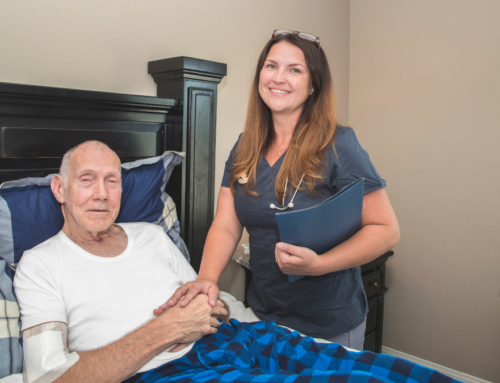
Caring for an aging loved one can test your budget as much as your patience and endurance. Fortunately, there are federal, state and even local government programs that can help you make ends meet, find and afford care for your loved one and even obtain respite care for yourself.
Here is a guide to the top 10 government resources every caregiver should know about.
- Medicare
There is more to Medicare than just Part A (hospital insurance) and Part B (medical insurance). If the person you are caring for is 65 or older and collecting Social Security, it is likely that they receive Medicare Part A for free and their Medicare Part B premiums are automatically deducted from the monthly benefits they receive from the Social Security Administration (SSA). Part D prescription drug coverage is subsidized by Medicare through payments to private insurance companies who then fund an average of 90 percent of the cost of prescription drugs. If your loved one is considered low income and has limited assets, they may qualify for a Medicare Savings Program. Depending on the program they are eligible for, Medicare may help pay for Part A and/or B premiums as well as coinsurance, deductibles, and copayments. Another program called Extra Help is also available to minimize costs associated with Part D (prescription drug) plan costs. These options may provide substantial cost savings.
- Social Security
If your loved one’s Social Security benefits were earned through lower-paying jobs and these benefits are their only source of income, there may be a larger monthly benefit available from the SSA called Supplemental Security Income (SSI). The SSI program is operated by the federal government and provides seniors and blind or disabled individuals with monthly payments to supplement their income. SSI is a needs-based program, so applicants must meet certain income and asset requirements to be eligible. Qualification for SSI is usually used as an indicator that individuals also qualify for other needs-based programs and benefits, such as Medicaid and the Supplemental Nutrition Assistance Program (SNAP).
- Administration on Aging (AoA)
The AoA administers many national programs and services for elders, including health insurance counseling, legal assistance, protection from elder abuse and help with long-term care. The AoA also oversees a network of community-based organizations, such as Area Agencies on Aging (AAAs) and Aging and Disability Resource Centers (ADRCs), that offer in-person assistance with accessing these programs and services. AAAs are staffed by professionals who are knowledgeable about resources for seniors and caregivers. They can walk you through the specific qualifications and even help prepare the necessary applications and gather supporting documentation.
Find your local Area Agency on Aging in the AgingCare.com Directory »
- Department of Veterans Affairs (VA)
If your loved one is a military veteran (or is/was married to a veteran), they may be entitled to several different benefits through the U.S. Department of Veterans Affairs. The VA offers health care services, pensions, disability compensation, burial benefits, and other services to eligible vets and their qualifying family members. While the application and approval processes can be lengthy, the best place to start is locating a veteran’s discharge papers (also known as DD Form 214). This form is used by the VA to determine the nature of a veteran’s discharge or separation from active duty in the armed forces, one of the fundamental eligibility requirements for most VA benefits.
Read: VA Benefits for Veterans and Their Caregivers
- The Health Insurance Portability and Accountability Act (HIPAA)
The Health Insurance Portability and Accountability Act (HIPAA) of 1996 protects each person’s rights over their health care information. HIPAA sets rules for health care providers and health plans to regulate who can view and receive patients’ sensitive medical information. This law also prohibits family members from viewing one another’s medical records, which can seriously complicate the task of helping an aging loved one manage their health. Unless your loved one signs a HIPAA release form granting you permission to discuss their condition with physicians, you will be unable to access any information about their health. You can learn more about this law on the HIPAA website. To obtain HIPAA authorization forms, ask your loved one’s physician and file copies with every medical professional involved in their care to ensure you have access to crucial information.
- The Americans with Disabilities Act National Network
If your loved one has a disability, it may be helpful to learn about the Americans with Disabilities Act (ADA) administered by the U.S. Department of Justice. The ADA prohibits discrimination against disabled individuals in all aspects of public life, such as employment, state and government programs, transportation, public accomodations, telecommunications, and commercial facilities. The Department of Health and Human Services has created the ADA National Network, a resource that provides information, briefings and free publications on the regulations granting universal access to the disabled.
- The National Institutes of Health (NIH)
Seniors typically take several prescription and over-the-counter medications. As a caregiver, it is important to be aware of what your loved one is taking and why, as well as the side effects and interactions these drugs can have. The National Library of Medicine, a part of the NIH, hosts a comprehensive online database of every drug approved by the Food and Drug Administration called MedlinePlus. Consumers can use this database to search for information on medications, including active ingredients, uses, dosing recommendations, special precautions, side effects and interactions. MedlinePlus also features a database of this detailed information for herbal remedies and dietary supplements.
- Your U.S. Senators
Every senator has a staff specialist on elder affairs, programs and services, who can both advise and advocate for benefits or services for you and your loved one. You can find contact information for both of your state’s senators using the U.S. Senate website.
- Your Congressional Representatives
Most congressmen and congresswomen in the House of Representatives also have staff specialists on elder affairs, programs and services and can provide both information and advocacy services. Contact information for all of your state’s representatives is available on the U.S. House of Representatives website.
- Medicaid
Medicaid is a joint federal and state program that provides health coverage to low-income Americans. Adults may qualify for Medicaid if they are disabled or age 65 or older. Unlike Medicare, Medicaid covers various types of long-term care and home and community based care services. However, applicants must meet stringent financial requirements to be approved for Medicaid coverage. Each state administers its own Medicaid program, so the exact eligibility criteria vary. For more general information on the program, visit Medicaid.gov. For information specific to your state’s Medicaid program, visit your state’s government website.
How to Access These Government Resources and Others
Access to assistance is as close as your computer, and, in most cases, you can apply online. Start by visiting the following two websites that can help determine which of the above programs you and your loved one may be eligible for as well as any others that might be unique to your area.
Benefits.gov: This site features an in-depth Benefit Finder tool that serves as a single access point for information on federal, state and local programs from across 17 different federal agencies. You’ll need to gather all the information you can relating to your elderly loved one’s health, disability, income, assets, military service, education level and more. When completing the Benefit Finder questionnaire, respond as accurately as you can. After submitting your answers, the site will generate a list of government programs, supplements and services you may qualify for, including application details and eligibility information.
www.Benefitscheckup.org: This non-profit site run by the National Council on Aging will ask many of the same questions as the site above, but this one is developed specifically for seniors. Therefore, it may report additional programs, details and contact information that fit your situation.
Using these resources, caregivers can gain access to vital information, monetary assistance and services for their aging family members. These programs can provide added support that may help seniors stay healthy and active longer and reduce caregiver stress.
Source: 10 Government Resources Every Caregiver Should Know About – AgingCare.com





